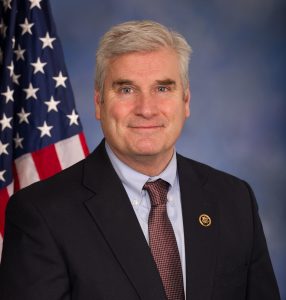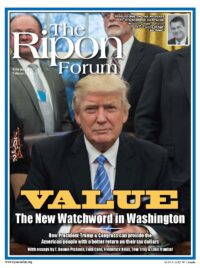 As President Donald Trump took office, Republicans in Congress were swept up in the reality of the opportunity that lies ahead. Conservatives finally have an administration which affords them the ability to unwind years of unilateral policymaking that has constrained economic growth, weakened our national security, and increased federal intrusion into our everyday lives. For many, myself included, a policy “about-face” on so many fronts cannot come soon enough.
As President Donald Trump took office, Republicans in Congress were swept up in the reality of the opportunity that lies ahead. Conservatives finally have an administration which affords them the ability to unwind years of unilateral policymaking that has constrained economic growth, weakened our national security, and increased federal intrusion into our everyday lives. For many, myself included, a policy “about-face” on so many fronts cannot come soon enough.
When it comes to furthering economic and diplomatic ties with Cuba however, such a policy reversal may be the last thing a Trump Administration should undertake.
The actions President Obama took on December 17, 2014 to begin normalizing relations with Cuba, as unilateral as they were, opened up a line of communication that was otherwise dormant for more than half a century. While engagement with Cuba may not result in unprecedented levels of economic growth or immediate peace and prosperity in the region, there are numerous benefits that could be realized if we continue to shift away from the Cold War mentality of isolation.
The economic opportunities made possible through continued U.S. engagement with Cuba expand well beyond agriculture.
With a population of just under 11.2 million, the Cuban economy is heavily reliant on imports to sustain itself. In 2014, Cuba imported $9.3 billion in goods, including nearly 80 percent of its food. Unfortunately, rather than ensuring Cuban families and restaurants source their produce and food products from American farmers, the United States – which used to be one of Cuba’s main sources of agricultural goods – has actually seen its share of the agriculture export market steadily decline in recent years due to embargo-related restrictions. Instead, the Cuban government has increasingly shifted its agricultural purchases to European countries like France and Germany, in addition to Brazil, Argentina, and Canada which offer more favorable credit and financing terms for agricultural products.
As a representative from one of the largest agriculture producing states in the country, it is imperative that Minnesotan agriculture producers and growers have the opportunity to compete for access in this marketplace just 90 miles off our Florida coast. That is why legislation like Representative Crawford’s Cuba Agriculture Exports Act, which enables financing for the sale of agricultural commodities to Cuba, is so important. Improving access to Cuba’s $2 billion agricultural import market will bolster an industry that supports millions of American jobs and families.
The economic opportunities made possible through continued U.S. engagement with Cuba, however, expand well beyond agriculture. While the travel and tourism industry is a widely acknowledged beneficiary of improved relations with Cuba, other industries are poised to benefit as well.
Lifting the embargo is not just about the economic benefits – it will also strengthen our national and regional security
Consider the following statistics – from 2008-2015: the number of mobile phone subscriptions in Cuba has increased to 3 million; the number of Wi-Fi hotspots on the island increased from zero to 65 by the end of 2015 and continues to grow; and the percentage of the island’s workforce in the Cuban non-agricultural private sector (which consists largely of self-employed entrepreneurs known as cuentapropistas) has grown from 17 to 29 percent. Service providers have also experienced growth, including Airbnb, a popular U.S.-based travel and accommodation company which began operating in Cuba in April 2015 and now has over 4,000 listings.
These trends reaffirm the Cuban people’s desire to “get connected” and join the global economy. They also represent opportunities for the United States. Lifting the embargo will enable businesses, services, and content to enter the Cuban marketplace, creating American jobs and allowing American brands, culture, and even democracy to take root. That is why I have introduced the Cuba Trade Act of 2017, to lift the embargo and make these opportunities a reality. By giving American businesses the ability to trade freely with Cuba, we are empowering two of our nation’s strongest ambassadors for change; the American people and the American private sector.
But, lifting the embargo is not just about the economic benefits – it will also strengthen our national and regional security. History has demonstrated that there are other nations eager to fill the United States’ role while the embargo is in place. Countries like Venezuela and China have sought to maintain their influence on the island and unfortunately, these nations do not always share our values or have our best interests in mind. In a time where the threat of attack can come from another nation or a lone actor, we need to ensure we maintain a strong and secure relationship with our neighbors in the region.
Correcting our course with Cuba will be challenging, but our nation cannot afford to revert back to a policy of isolation. This does not mean we should discard the claims of the many who have lost their freedoms, their property, or even their loved ones under the brutal Castro regime. However, by engaging with Cuba we can create new jobs, improve our security, and generate new opportunities for both countries as we work to right the wrongs of the past.
Tom Emmer represents the 6th District of Minnesota in the U.S. House of Representatives.




